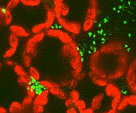Plant Pathology, Department of

Department of Plant Pathology: Faculty Publications
ORCID IDs
Satyanarayana Tatineni https://orcid.org/0000-0003-0395-6000
Document Type
Article
Date of this Version
2023
Citation
Phytopathology 2023, 113:117-141
doi:10.1094/PHYTO-05-22-0167-RVW
Abstract
Plant viruses cause significant losses in agricultural crops worldwide, affecting the yield and quality of agricultural products. The emergence of novel viruses or variants through genetic evolution and spillover from reservoir host species, changes in agricultural practices, mixed infections with disease synergism, and impacts from global warming pose continuous challenges for the management of epidemics resulting from emerging plant virus diseases. This review describes some of the most devastating virus diseases plus select virus diseases with regional importance in agriculturally important crops that have caused significant yield losses. The lack of curative measures for plant virus infections prompts the use of risk-reducing measures for managing plant virus diseases. These measures include exclusion, avoidance, and eradication techniques, along with vector management practices. The use of sensitive, high throughput, and user-friendly diagnostic methods is crucial for defining preventive and management strategies against plant viruses. The advent of next-generation sequencing technologies has great potential for detecting unknown viruses in quarantine samples. The deployment of genetic resistance in crop plants is an effective and desirable method of managing virus diseases. Several dominant and recessive resistance genes have been used to manage virus diseases in crops. Recently, RNA-based technologies such as dsRNA- and siRNA-based RNA interference, microRNA, and CRISPR/Cas9 provide transgenic and nontransgenic approaches for developing virus-resistant crop plants. Importantly, the topical application of dsRNA, hairpin RNA, and artificial microRNA and trans-active siRNA molecules on plants has the potential to develop GMO-free virus disease management methods. However, the long-term efficacy and acceptance of these new technologies, especially transgenic methods, remain to be established.


Comments
U.S. government work